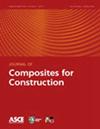Bond Behavior of Prestressed CFRP Strips-to-Concrete Joints Using the EBROG Method: Experimental and Analytical Evaluation
IF 2.9
2区 工程技术
Q2 ENGINEERING, CIVIL
引用次数: 3
Abstract
7 Fiber-reinforced polymer (FRP) composites are widely employed as externally bonded reinforcement 8 (EBR) systems for strengthening of reinforced concrete members. More recently, a new technique, re-9 ferred to as externally bonded reinforcement on grooves (EBROG), has been proposed, which is based 10 on using a number of grooves throughout the concrete substrate with the aim of enhancing the bond 11 strength between the FRP composite and concrete. This study investigates the influence of groove depth 12 on the resulting debonding process that can be observed in prestressed carbon FRP strips. To do so, 13 prestressing force release tests were conducted on a series of EBR and EBROG FRP strips bonded to 14 concrete specimens. Test results demonstrated that the fracture process leading to debonding of the 15 EBROG specimens developed in a significantly different manner with respect to the case of EBR spec-16 imens. Specifically, fractures ran through deeper layers of concrete as the grooves became deeper. Nu-17 merical analyses are also proposed to scrutinize the actual bond-slip law characterizing both EBR and用EBROG方法研究预应力CFRP条与混凝土节点的粘结性能:试验与分析评价
纤维增强聚合物(FRP)复合材料被广泛应用于增强钢筋混凝土构件的外部粘结增强(EBR)体系。最近,提出了一种新技术,称为沟槽外部粘结加固(EBROG),该技术基于在整个混凝土基材上使用许多沟槽,目的是提高FRP复合材料与混凝土之间的粘结强度。本研究探讨了槽深12对预应力碳纤维FRP条剥离过程的影响。为此,对一系列EBR和EBROG FRP条粘结在14个混凝土试件上进行了13次预应力释放试验。试验结果表明,15种EBROG试件的断裂过程与16种EBR试件的断裂过程明显不同。具体来说,随着沟槽的加深,裂缝会穿过更深的混凝土层。还提出了Nu-17数值分析,以仔细审查实际粘结滑移规律的特征,EBR和
本文章由计算机程序翻译,如有差异,请以英文原文为准。
求助全文
约1分钟内获得全文
求助全文
来源期刊

Journal of Composites for Construction
工程技术-材料科学:复合
CiteScore
7.40
自引率
8.70%
发文量
102
审稿时长
3 months
期刊介绍:
The Journal of Composites for Construction publishes original research papers, review papers, and case studies dealing with the use of fiber-reinforced composite materials in construction. Of special interest to the Journal are papers that bridge the gap between research in the mechanics and manufacturing science of composite materials and the analysis and design of large civil engineering structural systems and their construction processes. The Journal publishes papers about composite materials consisting of continuous synthetic fibers and matrices for use in civil engineering structures and subjected to the loadings and environments of the infrastructure. The Journal publishes papers about composite materials in stand-alone forms (e.g., structural shapes) or used in conjunction with traditional construction materials such as concrete, masonry, metals and timber, either as reinforcing members or in hybrid systems, for both new construction and for repair and rehabilitation of existing structures. The Journal also publishes papers about codes and standards related to fiber-reinforced composites for construction.
 求助内容:
求助内容: 应助结果提醒方式:
应助结果提醒方式:


